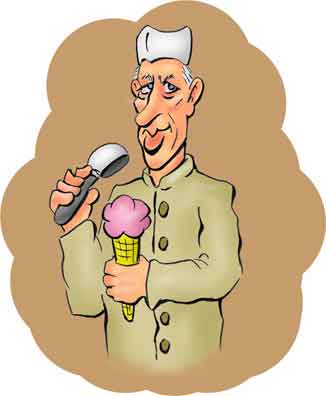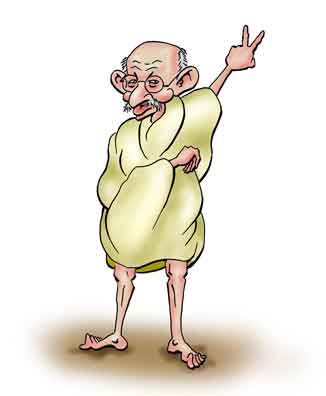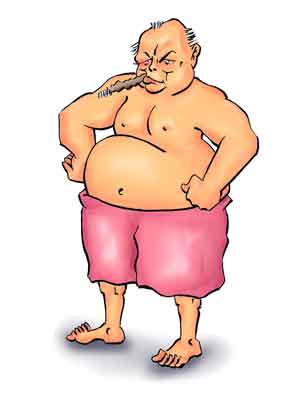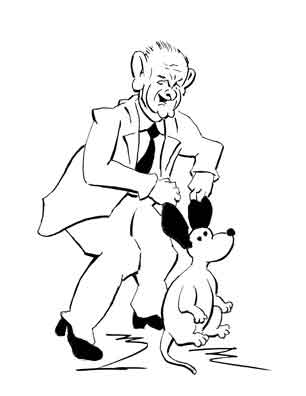Jawaharlal Nehru
पण्डित

Jawaharlal Nehru
The LBJ of India?
This rendition of Jawaharlal Nehru is not intended to be a cheap joke in poor taste. Instead, it is presented to illustrate the ignorance and superstition that was rampant in the Western Culture of the time when Pandit Nehru (for those who couldn't pronounce "Jawaharlal") was the first prime minister of India.
In fact, everyone of Western upbringing (certainly in  ) who saw Jawaharlal's frequent photographs immediately wondered why the head of one of the world's most populous countries wore a hat that looked like that of a soda jerk or a good humor man.
) who saw Jawaharlal's frequent photographs immediately wondered why the head of one of the world's most populous countries wore a hat that looked like that of a soda jerk or a good humor man.
Today the phrases "soda jerk" and "good humor man" have gone the way of "twenty-three skidoo" and "groovy chick". But what is now called the Gandhi cap is still popular in India. It's doubly ironic that the cap has become such a favorite because 1) at one time it was intended to be a mark of humiliation, and 2) the Mahatma rarely wore it.
Ironic, yes. Perplexing, no.

THE Mahatma Gandhi
The Great Soul
The Mahatma had begun his long struggle for Indian independence in South Africa (for more details of his life, times, and habits you can click here). His call for the Indians of South Africa to deliberately disobey unjust laws ended up getting him thrown in the slammer. And the non-European prisoners were required to wear what is properly termed a military side cap. To keep the hat cheap and easy to make, it was made of a fabric called khadi which is mostly undyed cotton.
So by wearing the Gandhi cap, the Mahatma's followers were stating that his imprisonment was a badge of honor, not shame. Therefore they were glad to sport the cap themselves as a show of solidarity. Jawaharlal began wearing the cap as part of his own attire at least by the late 1920's.
Jawaharlal was born in 1889 in Allahbahad (also called Prayag) which is about 350 miles east-southeast of New Delhi. His dad, Motilal, was quite well-to-do and as was usual at the time made sure his son got a proper English education. Jawaharlal graduated from Cambridge University in England with the tripos in Natural Sciences which is still the usual curriculum for science students at that distinguished university. He then went on to study law at the Inner Temple and became a barrister and a judge back in India. For anyone who is interested, Jawaharlal spoke flawless English with an uppercrust British accent.
With his background and education, you might think that Jawaharlal was perfectly happy to be part of the British Empire. Well, Motilal, had been a strong advocate - some say a radical - for Indian independence. Actually Motilal would have been happy with Dominion Status which meant that the country controlled domestic matters but England handled its international affairs.
The usual story is that when Jawaharlal overheard a British officer laughing about the shooting down of unarmed civilians at Amritsar in 1919, he knew India had to win its full independence. Although seen as a follower of the Mahatma, in many ways Jawaharlal took an independent path.
For instance, at one point in the Non-Cooperation Movement, the Mahatma sat down with the Viceroy of India, Lord Irwin, whose real name was - get this - Ed Wood. They talked about what could be done to stem the rising tide of unrest. Ultimately in exchange for a number of British concessions, the Mahamta agreed to end acts of civil disobedience.
The fact that the Gandhi-Irwin Pact sent both the English and Indian hardliners into conniption fits (Winston Churchill practically split his finest pink silk undies) means it was proably a good agreement. Nonetheless one of those who thought the Mahatma had given in too much was Jawaharlal.

Winston Churchill
He had a fit.
But perhaps the most important area where Jawaharlal differed from the Mahatma was in matters of religion and whether it should be part of an independent democratic India. Although a Hindu by family and tradition, Jawaharlal was an agnositc - a "short-tempered" agnostic according to one writer - and had no use for the caste system. As he said:
The basic thing in India, which has led to very undesirable results, and in my opinion led to our downfall in the last few centuries and weakened us, is our caste system.
So long as the caste system continues to exist in this country, democracy and people's rule have absolutely no meaning.
How can the concept of equality and of equal opportunities for all exist
side by side with the caste system which divides people into compartments
and leads to suppression of one section of society by others?
On the other hand the Mahatma said:
I believe that if Hindu society has been able to stand, it is because it is founded on the Caste system.
To destroy the Caste system and adopt the Western European social system
means that Hindus must give up the principle of hereditary occupation which
is the soul of the Caste system. Hereditary principle is an eternal
principle. To change it is to create disorder.
Obviously the Mahatma was not a member of the caste that made a living making fuel from cow dung or who climbed down into Calcultta's sewers to clear out blocked lines by hand. Actually the Mahatma's caste was the Vaishya, the farmers and merchants, and the name Gandhi in fact means "grocer".
Today opinion of Jawaharlal is divided. Yes, he couldn't prevent Partition - that is keeping Pakistan from splitting off from India - but then no one else could either. There the choices seemed to be to accept Partition or endure a civil war which would have ended in Partition anyway.
Partition of the Indian subcontinent into political boundaries defined by religion has been a recurring problem - defining nationality by religion is never a good idea. Before India's independence, Kashmir - or actually the Princely State of Jammu and Kashmir - was ruled by a maharajah, Hari Singh. The Princely States were political regions in India that were ruled by a single ruler but who acknowledged the authority of England. During the negotiations for independence, it was agreed a Princely State could make the choice to join India, join Pakistan, or remain independent.
So Hari at first opted to stay independent. But the reality was that all Princely States had to choose to being part of India or Pakistan. Otherwise they'd find, as did Hyderabad, that tanks would be rolling in from one country or the other. Hari opted to stick with India.
However Pakistan felt that the western part of Kashmir geographically, politically, and - being predominantly Muslim - religiously should be part of Pakistan. But India pointed out that since Hari opted for India, that the decision should stand. Still Pakistan sent in troops to the West as did India in the East. Kashmir was soon occupied in a stand-off between the two countries that lasted for the next fifteen years.
Then things got fixed, right?
Weeeeellllllll, not quite.
You see, in 1962 the Chinese government - then controlled by Mao Tse-Tung (as he was then called) - said they had a beef. Mao felt China should have had a say in drawing their border with Kashmir. But England, India, and Pakistan disagreed, and so China sent troops into the northeast part of the country. To this day Kashmir is split into three regions occupied by Pakistan, India, and China and there is no end in sight.
Since today one of the most popular activities of arm-chair indignitaries is to blame someone other than themselves on the state of the world, some people say it's Jawaharlal's decisions that led to Kashmir's mess. He should, they say, have stood by Hari that Kashmir was to be part of India. But instead he agreed take the question to the United Nations which would lead to a referendum. The question was referred to the commission that had been set to to deal with India and Pakistan. Other than arranging a ceasefire nothing else was done, and no referendum has ever been held. And that's the way Kashmir been hung up every since.
We mentioned that the biggest difference between the Mahtama and Jawaharlal was their relgious views. Well, perhaps not. An even bigger difference may be that the Mahatma never was a politician in the sense he was officially part of a government (not that he wasn't as shrewd politician in a lot of other ways). So he never got saddled with having to run a modern country. Not so with Jawaharlal. And few people who ever ran a modern country have enjoyed widespread popularity.
In assessing Jawaharlal's legacy, you have to remember that throughout the world - with some exceptions - governments have shifted away from the "Great Society" models à la L(yndon) B(aines) J(ohnson). And in many ways, Jawaharlal was indeed the LBJ of India. He envisioned an India free of prejudice and discrimination with religious freedom but not religious control. The purpose of the government was to help promote the welfare of the citizens. But as far as we know Jawaharlal never showed anyone an appendectomy scar or pulled dogs by the ears. But both men enjoyed their smokes.

LBJ
Ear-puller Johnson
Jawaharlal also shared something of LBJ's fate regarding his legacy. During the Turbulent 60's - which was a worldwide phenomenon not just limited to the United States and England - the young whippersnappers thought of Jawaharlal as part of the - quote - "Establishment" - unquote. He was also a hybrid - not really of Eastern Culture and not of Western (an opinion with which Jawaharlal agreed). One current Indian author said he grew up learning to despise Nehru. But then he started reading not what people said about Jawaharlal but what Jawaharlal actually said and wrote himself. Suddenly Jawaharlal made a lot of sense.
For a while it looked like Jawaharlal would also put his stamp on America's culture. No, it wasn't the hat. But in the - quote - "Hippie Era" - unquote - say 1967 to 1973 - the Indian version of the button-upped jacket with the Mandarin collar that was favored by Jawaharlal became popular at least amongst the stylish upper-income men. Alas, like so many of the quote - "hippie styles" - unquote - this "Nehru Jacket" faded quickly and was pretty much gone with the 1970's. The jacket, though, is still worn in Southeast Asia where it is an item of apparel rather than a fad.
But in the end you have to wonder what would have happened if India hadn't had as its first prime minister someone who wanted a real democracy. Insteading of being the world's largest functioning democracy, India might have ended up being a autocratic state under perpetual militarization and constant warfare. We've seen a lot of those countries, such as ....
Well, no names.
References
"How India's Iconic Gandhi Cap Has Changed Sides", Andrew Whitehead, BBC World Service, April 28, 2014.
Jadoo, John A. Keel, Messner, New York, 1957.
"Learning to Love Nehru", Aatish Taseer, January 4, 2018
Selected Works of Jawaharlal Nehru, 61 Volumes, Jawaharlal Nehru Memorial Fund, 1984-2015.
"Still at the Margins: Dalits and the Nehruvian State's Efforts against Untouchability", Shayok Chakraborty", Claremont Journal of Law and Public Policy, June 27, 2017.
A History of British India, Hayden Bellenoit (Lecturer), The Great Courses.
"The Nehru Jacket Guide", Sven Raphael Schneider, The Gentleman's Gazette, May 20, 2013.
"Jawaharlal Nehru: A Stickler for Protocol and Penny-Pincher on Official Tours", The Economic Times (India), Nilanjan Mukhopadhyay, September 25, 2016.